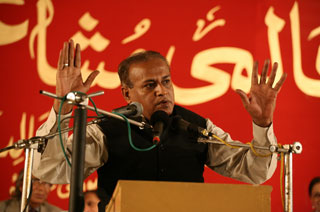And so it was Shahid entered the broken world/when everyone had bypassed the heart’s expectant bones
-Bones (After Hart Crane), Ghazal by Agha Shahid Ali
Don’t ask what happened to the defeated heart/Oh Faiz how it broke once again/into hopeless longing.
-Ghazal by Faiz Ahmed Faiz, Translated by Agha Shahid Ali
These problems of mysticism! This discourse of yours, Ghalib!/ We would consider you a saint-- if you weren't a wine-drinker.
- Ghazal by Ghalib, translated by Frances Pritchett
Tell your friends, Dagh, it’s not child’s play. The task of learning Urdu is uphill all the way.
- Ghazal by Dagh Dehlvi
I was at a mushaira, a gathering of Urdu poets in recital, one night in Karachi and I wandered backstage where I found 12 year old Anum Masood and her pink autograph book filled with bits and pieces of ghazal couplets she was jotting down from her favorite poets. She also wanted them to write their pen names, their takhallus, which all poets use in their ghazals’ last verse, as both a reflexive tribute to their implied genius and as a cry from the heart. Most ghazals can make the audience cry, or cry out Vah! Vah! and wave their hands in the poet’s direction, as if to tell them, I hear you, superb.
Takhallus is a word of Arabic origin meaning escape, liberation, or flight from- or riddance- as if the poet must establish a second persona, one not of himself, in order to compose and recite in public. Even when the takhallus is simply the poet’s first name, it is still an escape of sorts from whom they were born as. So I wondered whose names Anum was collecting in her pink book, and if she would remember them when she grew up.

